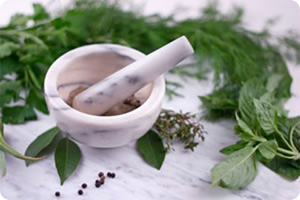Effects of Ayurvedic Herbs

A number of herbs are used as medicines in Ayurveda - the science of life. Since ages, herbs have been known to help relieve aches and inflammation. The Ayurvedic rishis in the ancient times used herbs and mixed them with other herbs to create medicines that could treat many deadly diseases. Some of them proved to be elixirs. The herbs used in Ayurveda have diverse chemical formation. They are effective in combating diseases, when taken according to the recommended doses. They produce very few or no side effects. Some herbs are used as general tonic to clean, nourish and rebuild on a cellular level, while others have affinity for a specific system or organ of the body. Know the effects of herbs in Ayurveda and their usage, in the following lines.
Benefits of Ayurvedic Herbs
- Herbs in Ayurveda help a great deal in proper absorption and digestion of food. They also help as an appetizer.
- Herbs can be used as preventive medicines as well. Sometimes, they are also used to strengthen the immune system.
- Apart from strengthening the immune system, the herbs can also give a boost to the system.
- In case a person is attacked by flu, viruses or suffering from any kind of bacterial infection, then the Ayurvedic practitioners usually prescribe herbs that are mixed with other herbs or consumed individually, to cure such conditions.
- Studies in medicinal science suggest that Ayurvedic herbs can also treat deadly diseases like cancer, AIDS and autoimmune disorders. It is also found that herbal treatment is an effective alternative to allopathic medicines.
- When a person is undergoing treatment for some chronic diseases, Ayurvedic herbs can provide nourishment and support to the body.
How To Use Herbs
Internal Usage
- Some of the most common internal forms of herbal medications include encapsulated herbs, fresh herbs, flower essences and essential oil dilutions.
- The effects of herbs can differ, depending upon the media of ingestion. For instance, certain herbs are more desirable to be ingested, if their medicinal properties are intended to affect the important internal organs of the body, such as the heart, lungs, liver, kidney etc.
- The herbs used to cure internal organs of the body are ingested using different media, which may include water, honey, oil, ghee and milk. Different media have their own unique effects on the body of the person consuming them.
External Application
- The external applications of herbs are intended to treat symptoms on or near the surface of the body, such as the skin.
- Herbs taken externally are often in the form of essential oil blends, liniments, ointments, lotions, massage oils, pastes or body wraps.
- Joint problems, dizziness, muscular problems, wounds, cuts and other skin diseases can be effectively cured by the external herbal treatment. Application of the herbs on the skin is the common way to treat such problems.
| |
Other Categories
Effects of Ayurvedic Herbs
Types Of Ayurvedic Herbs
Significance of Ayurvedic Herbs
Properties of Ayurvedic Herbs
Main Categories
Ayurveda Concepts
Nidan
Ayurvedic Approach to Healthy Life
Kaumarbhrutya
Ayurveda Diet
Ayurvedic Herbology
Prasuti Tantra
Principles of Ayurveda
Ashtang Ayurveda
Panchakarma Treatment
Prakruti and Vikruti
Dincharya
Ayurveda Basics
|

